|
In celebration of the Fourth General Congress of the Union of the Catholic Apostolate, the Catholic Apostolate Center will share weekly homilies from the Congress. Holy Eucharistic Celebration in Preparation for the UAC General Congress Church of San Salvatore in Onda, Rome, June 19, 2024 Theme: “With Christ, our hope, we set out again together with joy and hope renewed.” Dear Brothers and Sisters of the Pallottine Family,
As we gather together to pray for the entire Pallotttine Family, and for the forthcoming UAC General Congress in particular, I wish to begin by sharing with you two quotations about the power of prayer. “Prayer is the place of refuge for every worry, a foundation for cheerfulness, a source of constant happiness, a protection against sadness,” said St. John Chrysostom. Pope Francis once said: “Our strength is prayer and the prayer of the humble person is the weakness of God. The Lord is weak only in this one sense. He is weak before the prayers of His people.” We are very busy with the preparations for the IV General Congress of the UAC scheduled to take place in Rome from 25th to 31st July 2024. Naturally, there are many practical things to do and some of us are really working hard for its successful conduct. However, we realize that the most powerful spiritual tool before us is prayer for the blessings of God for the Union and for the Congress in particular. Following the words of St. Chrysostom, and knowing that prayer is the place of refuge for every worry and the foundation for cheerfulness, we wish to celebrate the Holy Eucharist at the altar of St. Vincent on every Wednesday until the 24th July 2024, together with the entire Pallottine Family, and pray for the success of the General Congress. We pray that this international event may contribute to the life of the Union by creating the sense of communion among us and by producing good apostolic fruits for the Universal Church. Today we reflect on the main theme of the Congress itself: “With Christ, our hope, we set out again together with joy and hope renewed.” This is a theme chosen after a long process of discernment during the last General Coordination Council Meeting of the Union in 2022. The Biblical text that inspired the participants was the Emmaus experiences of the two disciples, as described by the Evangelist Luke (24: 13-35). The two disciples were running away from Jerusalem, totally disappointed and disillusioned after the death of Jesus. The Risen Lord came into their midst, walked with them, and explained the Scriptures about the true mission of the Messiah. Finally during the breaking of the Bread, they recognized the Risen Lord. They were filled with joy and a renewed hope and returned to Jerusalem to recount all that happened. They declared that Jesus was Risen Indeed. Their sadness turned into joy; their disillusionment turned into the Easter hope. Addressing the moderators and delegates of the Associations and Ecclesial Movements during the meeting on 13 June 2024, in which three of us from the Union also participated, Pope Francis spoke of three “synodal virtues that can derive from a spiritual conversion: thinking as God thinks, overcoming exclusiveness, and cultivating humility.” I share with you the thoughts of Pope Francis that can help us also to have the correct vision and spiritual attitudes within the UAC, leading to a renewed hope and a greater development within our Spiritual Family. The following are the thoughts of the Holy Father. First: thinking as God thinks. This is the primary interior change that is asked of us: to move beyond “merely human thought” to embrace the “thought of God.” Before making any decision, before starting any program, any apostolate, any mission within the Church, we should ask ourselves: what does God want from me, what does God want from us, at this moment, in this situation? Is what I envision, what we as a group have in mind, truly aligned with the “thought of God”? Let us remember that the Holy Spirit is the protagonist of the synodal journey, not we ourselves: he alone teaches us to listen to the voice of God, individually and as a Church. God is always greater than our ideas, greater than prevailing mindsets and the “ecclesial fashions” of the day, even the charism of our particular group or movement. Therefore, let us never presume that we are “in tune” with God: rather, let us continually strive to rise above ourselves and embrace God’s perspective, not that of men and women. This is the first great challenge. Thinking as God thinks. Second: overcoming exclusiveness. Please, let us be wary of the temptation of the “closed circle.” These are challenges for us: limiting ourselves to what our “circle” thinks, being convinced that what we do is right for everyone, and defending, perhaps inadvertently, positions, prerogatives, or the prestige of the “group.” Alternatively, we could also be impeded by the fear of losing our sense of belonging and identity by opening up to other people and differing viewpoints, which stems from failing to recognize diversity as an opportunity rather than a threat. These are “enclosures” in which we all risk imprisonment. Let us be attentive: our own group, our own spirituality are realities that help us journey with the People of God, but they are not privileges, for there is the danger of ending up imprisoned in these enclosures. Thirdly and finally: cultivating humility. Here we understand that the starting point of spiritual conversion must be humility, the gateway to all virtues. It saddens me when I encounter Christians who boast: because I am priest from this place, or because they are lay people from that place, because I am from this institution... This is a bad thing. Humility is the door, the beginning. It compels us to scrutinize our intentions: what do I really seek in my relationships with my brothers and sisters in faith? Why do I pursue certain initiatives within the Church? If we detect a hint of pride or arrogance within us, then let us ask for the grace to rediscover humility. Indeed, only the humble accomplish great things in the Church for they have a solid foundation in the love of God, which never fails, and therefore they do not seek further recognition. This phase of spiritual conversion is also fundamental for building a synodal Church: only the humble person esteems others and welcomes their contribution, advice, inner richness, bringing out not their own “I”, but the “we” of the community. It is the humble who safeguard communion in the Church, avoiding divisions, overcoming tensions, knowing how to set aside their own initiatives in order to contribute to joint projects. In serving, they find joy and not frustration or resentment. Living synodality, at every level, is truly impossible without humility. I want to say once again, in order to emphasize the role of ecclesial movements: ecclesial movements are for service, not for ourselves. Ecclesial movements are meant to serve the Church, they are not a message in themselves, an ecclesial centrality. They are for service. Always think about this: my membership in an ecclesial movement, is it in the association or is it in the Church? It is in my movement, in my association for the Church, as a “step” to help the Church. Movements closed in on themselves, however, should be eliminated, they are not ecclesial. The above words of the Holy Father resonate the mysticism of St. Vincent Pallotti. He prayed: “Lord, destroy my life and let your life be my life.” He loved the Church and wished to form missionary disciples impelled by the love of Christ. Pallotti was the man of humility, poverty and service. Ego clash, domination, prejudices, exclusiveness etc., destroy the works of the Union. Hence the great need for spiritual conversion in all of us. There is an interesting episode mentioned in today’s first reading which can also give a key to a renewed hope within the Union. Elijah was about to be taken up to heaven. At that point Elijah said to Elisha, “Ask what I shall do for you, before I am taken from you.” And Elisha said, “I pray you, let me inherit a double share of your spirit.” And Elisha received a double share of the spirit of Elijah. He took up the mantle of Elijah that had fallen from him, and went back and stood on the bank of the Jordan. He struck the water, saying, “Where is the Lord, the God of Elijah?” When Elisha had struck the water, the water was parted to the one side and to the other; and he went over (cfr. 2 Kings 2:1, 6-14). On this day, trusting in the great power of prayer, we too ask God for a double share of the spirit of St. Vincent Pallotti, that is the spirit of Jesus, the Apostle of the Eternal Father. May the UAC General Congress be an occasion to relive and celebrate this spirit and charism of St. Vincent in great humility, always in service of the People of God. Amen. Jacob Nampudakam, S.A.C. UAC President
0 Comments
I’m not much of a poetry person. I did what I could to avoid it in middle and high school, as well as college. But there is one poem that I like—in fact, that I love. It goes like this: “Hope” is the thing with feathers - That perches in the soul - And sings the tune without the words - And never stops - at all - And sweetest - in the Gale - is heard - And sore must be the storm - That could abash the little Bird That kept so many warm - I’ve heard it in the chillest land - And on the strangest Sea - Yet - never - in Extremity, It asked a crumb - of me. That is “Hope is the Thing with Feathers” by Emily Dickenson. I always liked the poem, the way it rhymes and the way it rolls off the tongue. It became even more important to me when my father became ill. I clung to this poem because it reminded me that hope is always with us; that even in the greatest storm, hope remains and remains without ceasing. As Christians, we cling to hope. This season of Lent which we find ourselves in right now is a period that prepares and leads us to that ultimate instance of hope in the Christian life: the Resurrection. Much like the hope that Dickenson writes of in her poem, the hope of the Resurrection remains with us at all times. It never stops, it remains with us in our souls, and it is, if I may create a word, “unabashable.” The thing is, it can be hard to see this hope in our lives, regardless of its unceasing presence. Pope Francis dedicates two paragraphs of Fratelli Tutti to the virtue of hope. He writes: Hope speaks to us of a thirst, an aspiration, a longing for a life of fulfillment, a desire to achieve great things, things that fill our heart and lift our spirit to lofty realities like truth, goodness and beauty, justice and love… Hope is bold; it can look beyond personal convenience, the petty securities and compensations which limit our horizon, and it can open us up to grand ideals that make life more beautiful and worthwhile” (Fratelli Tutti, 55). Hope transcends our ups and our downs, our individual trials and tribulations, not because they are insignificant, but because the Resurrection, in the end, is greater than every one of those. The hope of the Resurrection doesn’t minimize our trials, or even our personal convenience and petty securities, but it is the light which illuminates the darkness and allows us to move past them on our journey with Christ. The hope of the Resurrection, the hope of Christ perches in our soul and it sings the tune of Alleluia (pardon my use during Lent) without ceasing. This hope, much like the little bird that Dickenson describes, is in fact sweetest in the gale, in the storm, because we are called to recall that Jesus Christ will provide for us in ways that no other person or thing ever can. In the midst of Lent, much like through all of our sufferings, hope can be heard as a melodious tune above the groans of those trials which we face. May we look to hope, the thing with feathers, the Resurrection, this Lent and always. For more resources to accompany you during your Lenten journey, please click here. **This blog was originally published on March 16, 2021.**
Over the course of this past year, we have had many opportunities to lose hope. Friends and family became ill, we could not enjoy a common handshake or hug, loved ones died, churches, schools, and recreational activities were shuttered, and we were required to keep distant from each other. In such circumstances, it is easy to feel low, to feel alone, and to feel as though better times are not on the way. Yet, the saints we honor on this day teach us the exact opposite – in the darkest of times, that is when hope is most needed. By clinging to hope, one can get through any hardship. St. Thomas More (1478-1535) is probably one of the most well-known English Catholic saints. The quote, “I die the King’s good servant, and God’s first,” is attributed to him and typically serves as the basis for many a reflection on faithful citizenship. He was also a prominent humanist and counted the great Erasmus as a friend. More famously refused to acknowledge Henry VIII as head of the Church of England, leading to More’s imprisonment and eventual execution. While awaiting his trial, More composed his final work, A Dialogue of Comfort against Tribulation. He begins by stating that while some things can ease tribulation, like medicine, the most effective comfort is faith given by God. Because of faith, one can persevere through any trial encountered. He notes that one’s time on earth is fleeting compared to eternal life afterwards. Thus, one should live life striving to attain the rewards of heaven rather than those on earth. St. John Fisher (1469-1535) is perhaps less well-known to contemporary Catholics. However, in his own time, many considered him not only the greatest preacher but also the greatest theologian in all Europe. He served as the bishop of the Diocese of Rochester and chancellor of the University of Cambridge. Fisher defended Queen Catherine of Aragon when Henry VIII attempted to divorce her. He also refused to acknowledge Henry as head of the Church and paid the price of imprisonment and execution. Just before Fisher’s trial, Pope Paul III named him a cardinal. Asked to preach at the funeral of King Henry VIII’s father, Henry VII, Fisher began by declaring, “Let no man think that my intention is to praise him for any vain transitory things of this life.” The bishop went on to say that great wealth and power do not ensure eternal life. Rather, Fisher said, “The cause of this hope was the true belief he had in God, in his Church, and in the Sacraments thereof.” By holding strong to his faith in the merciful God, Fisher stated that Henry VII left this world in peace hoping to see his heavenly reward. It is easy to admire the great convictions of the great people of the past. It is much harder to match that same zeal. Pope Francis reminds us that prayer is “a sacred fire in us too, which burns continually and which nothing can extinguish.” Therefore, by working little by little, day by day, we can grow in faith and, thus, grow closer to God. And as we come closer and closer to Him, then no matter what may be going on around us, no matter the discouragement that may afflict others, no matter the tribulation, we can remain anchored in the hope that comes from God alone. To learn more about the saints, please visit our Catholic Feast Days page. For more resources on COVID-19, please click here. How are you navigating daily life these days? Are you scurrying around afraid of what is next or are you charging into each day with enthusiasm and hope? That sounds like the opening to an infomercial about to reveal some amazing product to enhance your life in some miraculous way, doesn’t it? But these are questions we need to ask ourselves as Christians; Jesus calls us to be exuberant about our mission in every moment because every moment counts. Life as we knew it before the Covid-19 pandemic has not returned, and all of us are still in some stage of the mess. But, as Easter people, we hold firmly to God’s promise that He is with us always, supplying grace and wisdom, no matter the circumstances of our present life. And this promise envelopes me personally with great comfort and allows me to begin each day with joy! The Easter message we celebrate again this year guides us through the steps of living in joy, filled with hope, even though our world seems dark and scary. Our daily scripture readings walk us through the Acts of the Apostles as the church was newly formed after the Resurrection and we learn once again of our mission as baptized priests, prophets, and kings in the new covenant Jesus established. Thirty minutes of ingesting current news makes us aware of the many divisions within our nation and on a global scale. There is very little uplifting or good news being reported. Our world is filled with turmoil and unrest, and the doom and gloom can seem overwhelming. But, let’s flash back to over 2000 years ago on a stormy Friday afternoon when Jesus was tortured and suffered an agonizing death by crucifixion and the earth shook. This horrifying event in the news of the time seemed bleak to the early Christians, yet in actuality, this event was the defining moment for all of humanity. It was and continues to be God’s greatest gift to us. In the dismal hours on Good Friday centuries ago, Jesus our Savior exhibited the ultimate “cancel culture” by completely canceling our sins and opening the path for us to enter the glory of heaven! In recent years, we are more familiar with a different type of “cancel culture” – one that is not merciful and has a negative message. Yet, if we focus on walking closely with Jesus, we can experience the freedom that comes from that horrific sacrifice on the Cross at Calvary. Our lives are forever redeemed, and the love and mercy of God allows us to live amidst times of great trial without fear and even be filled with joy. We have been commissioned for the work of heaven and as we live in this Easter season, we have the knowledge of Jesus’ teachings, His examples of how to love and act toward others, and His living Spirit within us to keep us steadfast in being joyful. We can smile when the world is unkind, courageously proclaiming the Good News in a culture that will scoff and try to shame and shun us because, as St. Paul says in Col. 2:13-14, “And you who were dead in trespasses and the uncircumcision of your flesh, God made alive together with Him, having forgiven all our trespasses, having canceled the bond which stood against us…. nailing it to the cross.” This is truly the “divine cancel culture” that heals us and rescues us from sin and death. The secular “cancel culture” reviles people who disagree, seeks to destroy those it determines unworthy, and ascribes to inflicting recriminations and paybacks. The “divine cancel culture” Jesus instituted from that Cross on Calvary expects us to always forgive and cancel the wrongs others do to us, as He taught us: “forgive us our trespasses as we forgive those who trespass against us” (Matt. 6:12). We can confidently choose to walk in the footsteps of our Lord and Savior and practice the principles of faith, hope, and love – love being the greatest of these. We walk together, you and I, as Easter people, united in the mission passed to us personally by Jesus Himself. Even though chaos may be swirling about us, He is who transforms our lives in a miraculous way so that we can live each day with exuberant joy! Help us Lord to be your messengers of love and mercy to the lost, the despairing, the cruel, the innocent and the vulnerable— to draw all your people to your glorious kingdom forever! Amen, Alleluia, Glory!
“Have you seen Him?”
The question is uttered among the bewildered Apostles and echoes out to us this Easter season. In the Gospel reading for Divine Mercy Sunday, Thomas hadn’t seen him. Thomas didn’t believe the men who had become his brothers when they told him about the resurrected Christ. Not even the details of his wounds swayed him. “Unless I see the mark of the nails in his hands and put my finger into the nailmarks and put my hand into his side, I will not believe,” he says. Believing meant vulnerability. It meant more heartbreak. The Man for whom Thomas and the others had left everything, the Teacher who had sent them two by two to preach and heal, the Master who had washed their feet and fed thousands with a few loaves and fish was gone—betrayed, tortured, killed. It was easier not to believe. It was easier to stay hidden away in the Upper Room with a heart as locked up as the doors. It was easier to go back to what they knew. Even Peter resumed fishing. Today as we continue in the third week of Easter, I ask you what the disciples likely asked each other in those first days: Have you seen Him? We prepared for Easter throughout 40 days with prayers, fasting, and almsgiving. We kept vigil with Jesus on Holy Thursday in the Garden of Gethsemane and in Caiaphas’s prison. We shuddered at His scourging, covered our ears to the mocking, and knelt in front of Him at the foot of the Cross. We waited in silence as the tomb was closed and we entered into Holy Saturday. Then, we celebrated His rising on the third day. But as we continue in the Easter season, can we truly say we have seen Him? Have we experienced Easter joy or are we locked in the Upper Room or back to fishing? Grief, anger, passivity, media consumption, alcohol, food, loneliness—all of these could be our Upper Rooms. All of these could be means of locking our hearts to the Good News of Jesus Christ. But what does Jesus do in response to our locked hearts? He shows up. He extends His wounded hands. He breathes peace. This is what this fifty-day Easter season is all about: encountering the Risen Lord. Seeing Him. Touching His wounds. Sharing a meal with Him. Allowing Him to open the Scriptures to us and reveal God’s plan of salvation—even in the here and now, even in our own lives. Our fasting, grieving, and sighing is over. Our desert is over. But sometimes entering into the light, joy, and beauty of the Easter season can seem jarring after all we’ve worked on spiritually or given up. Even more so, we look at the world and may not hear the Easter song. We see humanity still trapped by sin, death, and division. Perhaps our hearts, like Thomas’s and the other disciples’, are broken. Perhaps after a year of fear, isolation, confusion, and division, it feels easier to lock the doors than to believe. Believing requires faith, hope, vulnerability. It requires opening yourself to the possibility of another heartbreak. And it requires letting go. And so, Thomas says, “I will not believe.” And we may say, “I cannot believe.” But Christ’s wounds change everything. They show that suffering can be redeemed. That our scars, while part of our story, are not the end. That death has been humbled, and that glory and resurrection await us. Over these next few weeks of Easter, as we prepare to celebrate the Ascension of Jesus and the gift of the Holy Spirit at Pentecost, I invite you to spend time with the disciples as they sit once again at the feet of Christ. Jesus spends 40 days with them—the same length of time as the Lenten season—instructing them, encouraging them, accompanying them. Do not let this most holy of liturgical seasons end on Easter Sunday. I invite you today and every day to encounter the Risen Lord. Spend time with His wounds. Show Him your own. Allow His words to penetrate your heart: “Peace be with you.” Only then can the doors of our hearts be unlocked. Only then can our wounds be transfigured. Only then can we fall to our knees and proclaim with Thomas, “My Lord and my God.” Click here for more ideas to cultivate Easter joy.
I’m not much of a poetry person. I did what I could to avoid it in middle and high school, as well as college. But there is one poem that I like—in fact, that I love. It goes like this:
“Hope” is the thing with feathers -
That perches in the soul - And sings the tune without the words - And never stops - at all - And sweetest - in the Gale - is heard - And sore must be the storm - That could abash the little Bird That kept so many warm - I’ve heard it in the chillest land - And on the strangest Sea - Yet - never - in Extremity, It asked a crumb - of me.
That is “Hope is the Thing with Feathers” by Emily Dickenson. I always liked the poem, the way it rhymes and the way it rolls off the tongue. It became even more important to me when my father became ill. I clung to this poem because it reminded me that hope is always with us; that even in the greatest storm, hope remains and remains without ceasing.
As Christians, we cling to hope. This season of Lent which we find ourselves in right now is a period that prepares and leads us to that ultimate instance of hope in the Christian life: the Resurrection. Much like the hope that Dickenson writes of in her poem, the hope of the Resurrection remains with us at all times. It never stops, it remains with us in our souls, and it is, if I may create a word, “unabashable.” The thing is, it can be hard to see this hope in our lives, regardless of its unceasing presence. Pope Francis dedicates two paragraphs of Fratelli Tutti to the virtue of hope. He writes: Hope speaks to us of a thirst, an aspiration, a longing for a life of fulfillment, a desire to achieve great things, things that fill our heart and lift our spirit to lofty realities like truth, goodness and beauty, justice and love… Hope is bold; it can look beyond personal convenience, the petty securities and compensations which limit our horizon, and it can open us up to grand ideals that make life more beautiful and worthwhile” (Fratelli Tutti, 55). Hope transcends our ups and our downs, our individual trials and tribulations, not because they are insignificant, but because the Resurrection, in the end, is greater than every one of those. The hope of the Resurrection doesn’t minimize our trials, or even our personal convenience and petty securities, but it is the light which illuminates the darkness and allows us to move past them on our journey with Christ. The hope of the Resurrection, the hope of Christ perches in our soul and it sings the tune of Alleluia (pardon my use during Lent) without ceasing. This hope, much like the little bird that Dickenson describes, is in fact sweetest in the gale, in the storm, because we are called to recall that Jesus Christ will provide for us in ways that no other person or thing ever can. In the midst of Lent, much like through all of our sufferings, hope can be heard as a melodious tune above the groans of those trials which we face. May we look to hope, the thing with feathers, the Resurrection, this Lent and always. For more resources to accompany you during your Lenten journey, please click here.
“Remember the days past when, after you had been enlightened, you endure a great contest of suffering. At times you were publicly exposed to abuse and affliction, at other times you associated yourselves with those so treated. You even joined in the sufferings of those in prison and joyfully accepted the confiscation of your property, knowing that you had a better and lasting possession. Therefore, do not throw away your confidence, it will have great recompense. You need endurance to do the will of God and receive what he has promised. ‘For, after just a brief moment, he who is to come shall come, he shall not delay. But my just one shall live by faith, and if he draws back I take no pleasure in him.’ We are not among those who draw back and perish, but among those who have faith and will possess life.” -Hebrews 10:32-39 We are living in an extremely tumultuous time. For over a year, a virulent sickness has swept over the world and caused havoc with our health, our economies, and the very way we relate to one another. It has separated us from friends, co-workers, extended family, and our church community, to name a few. In battling its transmission, we have been forced into isolation—severely limiting gatherings, celebrations together, and even sharing hugs. We have been stretched beyond our normal mode of living and the equilibrium of our lives has been disturbed, with no end clearly in sight. On top of all this, we have experienced political and social unrest – polarized groups rising against one another, causing great division instead of building unity. For any individual, these circumstances could easily defeat us and have us succumb to despair. I think of the Marty Haugen song many of us sing every year during Advent: “For you, O Lord, my soul in stillness waits, truly my hope is in you.” It resounds in my mind and heart as we traverse through such unsettling circumstances. Amidst all the unknowns and unrest, I have witnessed a beautiful vision that overrides all the devastation of the circumstances we are in. I have seen people sacrifice to care for others and people coming together to celebrate the joy of life in trying situations. I have witnessed God living and walking among us through the selfless individuals choosing to stand tall in faith and do all things in love. As Christians we are taught “God is love.” We were created out of love, for love. We are part of God’s great creation and we belong to Him. He guides, instructs, and protects us always. What a magnificent testament to hope in! We pray in our Creed: “I look forward to the resurrection of the dead and the life of the world to come.” This is part of what we profess at Mass before we enter into the liturgy of the Eucharist – which is the source and summit of our faith. We receive the Body, Blood, Soul and Divinity of our Lord to nourish us in body and spirit. This profession of faith, this gift of communion, allows us to walk through all the adversities of life as joyful people who understand our hope lies not in this world but in heaven, forever. This living hope comes from being nurtured by the stories from Scripture, being taught prayers and devotions, receiving the sacraments of Reconciliation and Eucharist frequently, singing hymns of praise and thanksgiving, and practicing acts of kindness daily. What an ironclad defense we have against any evil that would afflict our body or soul! How beautiful it is that as Christians we can be united together in faith wherever we are. This is how I have remained steadfast in hope and overcome fear during these trials that continue to badger us. Surrounding myself with pictures of the Holy Family, the saints, the crucifix, listening to Christ-centered music, praying novenas and prayers, attending Mass often, and sitting in the quiet and listening for God to speak to me are all ways I actively participate in being a person of hope. Even more simply, just keeping my home clean and neat makes it a peaceful sanctuary where I can experience God’s presence. I have no control over the things of this world that loom large over me, but that is okay. As long as I adjust my spiritual armor and remain grounded in Christ, I have every reason to walk in hope, joyously, no matter the circumstances. My husband I adopted the habit of praying Saint Patrick’s Breastplate each morning before going out into the fray and it has born much good fruit in our lives. I offer it to you as another tool to assist you in the battle against evil. We are children of light, born of love and destined for heaven. We belong to Him. He made us a community and all around the world, individually and in groups, we profess our faith boldly, we share His message of love constantly, and we support one another in solidarity of His kingdom. It is our job to remain in Him and He will supply all the grace needed to walk tall in hope. As St. Teresa of Avila said: ‘God withholds Himself from no one who perseveres.’ For more resources to guide you through the COVID-19 pandemic, please click here. For more resources on prayer, please click here. Baptism is one of my favorite subjects to teach my Pre-K students. Often, it is the first time the boys and girls really get a chance to learn about what Baptism is. Other times, it provides them a chance to share about their own sacramental experience or that of someone they know. Throughout the unit, everyone is given a chance to celebrate being part of God’s family in the Church. Learning about Baptism is a PreK standard in their catechesis, and we begin January by learning about Christ’s Baptism in the River Jordan. We learn that it was John the Baptist who prepared the way for Jesus and offered a baptism of repentance. John came before Jesus telling the people to, “’Prepare the way for the Lord!’ preaching a baptism of forgiveness of sins” (Mk 1:3-4).
Like the people whom John baptized and preached to, we likely are feeling in need of renewal. As we welcome this new year, we can also be renewed and cleansed from such a challenging year spiritually, emotionally, and physically! We can start fresh this year, and hear John, “a voice crying out in the desert.” For me, 2020 often felt like a desert. At times, I felt as though my thirst for the Eucharist was unbearable since going to Church was unsafe. Other times, it seemed like I was stranded alone with a new baby and deserted by any additional help. This year has taken its toll on so many, in so many ways, and everyone’s desert has been hard. This pandemic has left many of us yearning, thirsting, and begging the Lord for renewal. Let us consider putting on a new self in renewing our own baptismal promises, participating in the Sacrament of Reconciliation, and entering 2021 with clean and refreshed hearts! My son was welcomed into the Church through Baptism in September. We followed the safety restrictions, had an option for virtual participation, and were able to celebrate our little child of God being cleansed of original sin. It was a humbling and beautiful Mass and Baptism. While I was holding my son, Vincent (named after St. Vincent Pallotti), I could feel God's presence and see it unfolding before my eyes. For a moment, my desert had become an oasis. Life, water, joy, gratitude, my little boy’s squeals, and love were present there with us. I knew there and then that my son had been renewed and would in turn bring some renewal into our lives. Just as my son’s baptism brought refreshing hope into my family’s life, the Lord’s Baptism can bring renewal and hope into our lives as Catholics. At the Lord’s Baptism, he received his mission. May we continue to reflect upon our own mission as disciples in this upcoming year. Our hearts are yearning to be cleansed and renewed amidst our many deserts. Like my students learning about Baptism for the first time, let us engage our hearts and open our ears to the Word anew. Like my son’s Baptism showed me an oasis amidst a desert storm, let us find joy in our own Baptisms this year. Here is a prayer to leave you with as we begin the year anew: Heavenly Father, as a new calendar year begins, cleanse us with new hope and give us nourishment in your Son, Jesus Christ. Wash away our sadness, pain, and fears and help us to know your love throughout this upcoming year. Help us prepare the way for you to come into our hearts, oh Lord. Turn our own desert into oasis. In Jesus' name we pray, Amen. A lyric of one of my favorite Advent hymns, “O Holy Night,” shares the simple yet profound posture in which we are called to enter into the Advent and Christmas seasons: on our knees. Perhaps many of us already find ourselves there—either out of reverence or sheer exhaustion. For many, the year 2020 will forever be overshadowed by confusion, darkness, anxiety, fear or stress due to the COVID-19 pandemic. Perhaps you, like me, have just wanted it all to be over. We may feel tired of the masks, the canceled events, the physical distance from our friends and loved ones, uncertain job security, or the fear for our health and for those around us. Our hands are raw from sanitizer. Our hearts are raw from stress and confusion. Pandemic fatigue is real. Is this exhaustion, stress, and confusion similar to what the Jewish people felt as they traversed to their hometowns for Caesar Augustus’ census two thousand years ago? “Where is the Savior foretold by the prophets?” they must have thought. “Where is the king who would overthrow all oppressors and establish God’s kingdom forever? Where is God? And why does he seem silent?” For God’s Chosen People, continued faith and hope must have been a hard choice. For God’s chosen people, continued faith and hope is a hard choice. And it is precisely when we are caught up in our feelings of negativity, sadness, or desolation that we fail to see God at work. Too consumed by looking inward, we forget to look up and see the star. It is precisely for this reason that hardly anyone attended the most important event in all of human history: the birth of the Savior of the World, a child born quietly in the recesses of Bethlehem. So where do we find ourselves? Are we grumbling that God has not done enough to fix our broken situation? Are we stressed about the logistics to get our family to the census? Are we awaiting our own version of the Messiah, making our own golden calves? Do we look back longingly, preferring the slavery of Egypt to the wilderness? Or have we abandoned our relationship with God altogether? Finally, are we on our knees? Mary models this posture with her very life. I cannot help but imagine that she received the news from the Angel Gabriel on her knees. “How can this be?” she asked, greatly troubled at what was said in the midst of the holy and miraculous encounter. Her fiat was only possible because of her posture of humility. This receptivity is what every Christian is called to emulate. This posture in the presence of God is also important because kneeling is a physical reminder of reality: God is God, and we are not. Put another way, God is Creator, we are created. By kneeling in prayer, we enter into a dialogue with God in a posture of humility that reflects the true order of reality. Kneeling is also a posture of vulnerability that manifests our littleness before a great God. This littleness is not belittling, but reveals our true dignity. We have the courage to kneel because, in a sense, God knelt first. As St. Paul reminds us, “He emptied himself, taking the form of a slave, coming in human likeness; and found human in appearance, he humbled himself” (Phil 2:7). How can we then fear to approach such a gentle and humble Savior? If 2020 has taught us anything, it’s that we are not in control. Mary experienced this too. She did not anticipate a virgin birth, losing her Son for three days, or watching her Son’s crucifixion. This lack of human control is the truth regardless, but it’s a reality often obscured by our schedules, appointments, bank accounts, occupations, or social events. And when many of these good things have been stripped from our day-to-day lives, we are forced to reckon with our vulnerability. We are reminded that, ultimately, our Good Father holds us and our world in existence. We fall to our knees. Let us therefore approach Him lovingly this Christmas in this humble posture. Let us honor and reverence Him by offering to the Christ-child all our insecurities, fears, or limitations. I invite you to offer each sacrifice, hardship, or suffering as a piece of straw to warm the Christ-child this season. To look for the guiding star each day that leads us to Bethlehem. To name throughout the day what you are thankful for rather than succumb to grumbling. To spend some time reading Scripture, attending a Mass virtually or in person, sharing food or gifts with the needy, or singing an Advent hymn. To open our hearts to God’s way of doing things rather than grasping for control on our own. To fall on your knees. This season, may we join the shepherds, the wise men, and all the angels and saints in this humble posture filled with breathless hope, joy, and excitement to adore Christ the Lord, the newborn King, the answer to each prayer, the fulfillment of all desire. And may we prepare a full, warm manger for the Christ-child to rest in on Christmas Day. I watched her curly little head bounce away from me further down the hiking path and around a bend, out of my sight. I knew her older brothers would slow down so she could keep up with them, taking her under their wings. In the midst of a global pandemic, the woods were a safe space, open and free from the danger that seems to lurk everywhere these days. Nonetheless, my heart rate picked up along with my pace. What if a stranger was on the path? What if she fell and got hurt? I couldn’t see the path ahead, and I was afraid. I hurried along, my anxiety increasing as my steps forward failed to lead me to a view of my children. My thoughts turned dark while the woods around me became bright. Trapped in my own head, I failed to notice the sun breaking through, filtering light through the treetops. Until—there! The sunshine reflecting off of my little girl’s sequin covered sneakers allowed me to catch a glimpse of my babies. “Red light!” I yelled, in our family shorthand for “stop-moving-your-body-immediately.” The birds scattered, startled. My children froze in place as they waited for me to catch up with them. As I knew they would be, the boys were watching closely over their little sister. Taking her by the hand, they coached her through the mud and over the fallen branches. “See, Mama? Pretty!” my curly little girl exclaimed, joyfully depositing semi-crushed wildflowers into my hands. After rubbing her nose against mine, she joined her brothers on a moss-covered log, not registering my fear for even a moment. Exhaling a sigh of relief, I praised God in joy for great big brothers, my safe little girl, and a Father who is Light, illuminating the way. In this season of uncertainty, I find myself living that moment on the hiking path time and again: rushing forward, afraid, unable to see what is ahead. My days are filled with research and passionate conversation about schooling, and what the right choice for our family will be this fall. We deliberate over each barbecue invitation and mourn the loss of birthday celebrations that will never come to life. Parenting in a season where change is the only constant is overwhelming. I’m living that moment on the hiking path again: where I could not see, there was light. Though I was afraid, the Father was before me, protecting my little ones. So now, instead of remaining trapped by my thoughts, I am pursuing His power and protection. I am practicing seeking the light. In his letter to the Colossians, St. Paul reminds us that we can live in joy even in the midst of hardship, and he shows us how: “[We are] strengthened with every power, in accord with His glorious might, for all endurance and patience, with joy giving thanks to the Father who has made you fit to share in the inheritance of the saints in light. He delivered us from the power of darkness and transferred us to the kingdom[...]”(Colossians 1:11-12). Joy is a pursuit. By God’s great mercy, we are called out of the darkness and into the light. We are invited to share in the inheritance of the saints, if only we can pursue His power and glorious might instead of depending upon our own. When left to myself, I abandon joy for the hopelessness and despair that seems to permeate the world during this pandemic. However, when I pursue the heart of Christ, I am promised endurance and patience. I am equipped to face the reality of a sick and broken world and to remain unbroken by its weight. In His power alone, joy still abounds. Joy is a practice. Turning hands full of crushed wildflowers to praise comes with intentionality. So: let us train ourselves to joy. When we feel the dark closing in on us, we are called to joyfully give thanks to the Father and to seek His fingerprints that so graciously mark our lives—to acknowledge His many gifts. When the trees block our view, let us enjoy the sunshine filtering through their branches. When the path is rocky and unsure, let us acknowledge that He walks alongside us, and before us. When we suffer through sickness, hardship, and isolation, let us hope in God who has overcome suffering once and for all. This is joy. Grace-filled moments of contentment, happiness, peace, safety, and hope that we open our eyes to experience, even in the midst of the dark. Where happiness is fleeting and circumstantial, joy is ours to keep no matter the circumstance. Along this path I will stumble and fall. Joy will evade me as I am burdened by fear and uncertainty. But I will allow the Lord to raise me up, seeking the joy He offers me despite my skinned knees. Like my curly girl, I choose to trust that I am not alone. I choose wildflowers and light. I chase joy.
 This Easter season, I have been thinking a lot about my late brother Tim, who died in an accident seven years ago - at the age of 24 - while serving as an EMT in Indianapolis, IN. Tim’s death, along with the death of his IEMS partner Cody Medley, left all their friends and families at an inestimable loss. While I never got to meet Cody personally, I have learned that he was an exceptionally driven and talented young person who also served as a fire cadet before becoming a paramedic. Tim’s story is not much different; he was an Eagle Scout and volunteer EMS before going professional and passing his paramedic certification shortly before he died. In life, Tim achieved success in almost every field. As a teenager he won academic and musical scholarships and posted regular five-minute miles in outdoor and indoor track. He mastered Mandarin and spent an immersion summer in Shanghai. He participated in a service trip to Jamaica and volunteered back home as a “running buddy” alongside students with special needs in Central Park. These successes, paired with his later commitment to the medical profession, truly made him “A Man for Others” – the Jesuit motto of his alma mater, NYC’s Regis High School. Only looking backwards have I come to appreciate how brilliant Tim was. Perhaps you have a similar person in your family – someone who is so smart that they are intimidating. Tim was fearless in challenging others (especially those in authority) when he thought they were wrong. I have thought of him throughout this entire pandemic. As a first responder, I know that he would be helping wherever help was needed. As the outspoken person he was, I know he would have choice words for those he felt were ignoring public safety protocols. And most of all, as a cuttingly funny person, I know he would help me laugh during this time. Tim died three days into Lent, on February 16th, 2013. I have remembered him especially during every Lent and Easter since then. This past Lent was perhaps the most difficult yet. Many say that it takes seven years to heal from losing a loved one. The year 2020 marks seven years for all who loved Tim. To me, I felt healing – which also meant letting my guard down to feel fully the pangs of loss I couldn’t afford to feel in 2013. The coronavirus situation, if nothing else, has clarified the relationship between life and death. We are all vulnerable humans. This can be a scary thought, but also a freeing one. This can be a time to meditate on life as what it is – a short chance to grow, love, and serve others. We do not know how long the journey will last. I sometimes think that my brother attacked life the way he did because he might have sensed that he had less time than others. He used to wake me up after midnight, for instance, after I had already gone to bed, and say “Come on bro, get up, let’s make some memories.” At the time I thought he had a screw loose. Now I think he was prophetic. Recently in the Gospel readings, we hear Jesus tell the disciples, “Peace I leave with you; my peace I give to you. Not as the world gives do I give it to you. Do not let your hearts be troubled or afraid.” These words are a balm to all of us who have experienced loss, or who fear loss during these challenging times. As I read this passage, I am touched by the care and concern Jesus shows for his followers. He is also being quite honest with them and reminding them that they will lose him. The promise of peace is made realer by the reality of loss. This is what I receive from today and feel to be true in my own life. One year after Tim’s death, on Easter Sunday 2014, my family went to Mass in a church we had never been to before. The previous year had been difficult for everyone. Personally, I had not been taking care of myself mentally, physically, or spiritually. In the prior twelve months, I had not felt anything approaching peace. I was experiencing great fear and having awful panic attacks. That morning, sitting in the pews, waiting for Mass to begin, I suddenly noticed all sound around me fade out. I felt a sensation of all the breath leaving my body – and then my next breath was a slow, purposeful breath that was like drinking cool water in the desert. I was able to begin breathing in a deep and rhythmic way. Over the next few minutes, I felt as if warm light was streaming over me, from the head down. It was a feeling of complete release and relief. Ever since, I’ve been hoping to feel that peace again. Like my brother, I doubted (and still doubt) aspects of my faith. Tim wrestled to understand people who believe that faith and the intellectual life are incompatible. Being the true original that he was, I think he found it difficult at times to imagine a place in Christianity where he fit in. Yet after his death, I learned that some of Tim’s recent writings and reflections expressed the faith of a mature man who trusted in a loving God. I reflect on his words often as I remember my “kid brother” - who responded to numerous life-or-death situations and treated severe injuries which I would be terrified to walk into. Like everything else, Tim’s faith journey happened at a rate and intensity that most of us will never know. As Easter moves on and we navigate the new normal that is COVID-19, my spiritual suggestion (for what it’s worth) is this: In your prayers, dreams, and doings, try to let fear and hope co-exist. I will try to do the same. If we can hold those two seemingly irreconcilable opposites, we may find that peace can sprout like a flower right in between our hands. As I write this on May 9, it has been 54 days since the Diocese of Rockville Centre on Long Island, New York suspended all liturgies, devotions, meetings, and non-essential activities in parishes. This was the second major announcement for our parish family in East Patchogue in a 3-week period. At the beginning of March, our Capuchin Province of St Mary announced that we will be withdrawing our friars from the parish this summer. So, not only would we be without public Masses, we wouldn’t even have a chance to grieve our departure with the community. And if that wasn’t enough, only four days after beginning to stream Masses on Facebook Live, our pastor tested positive for COVID-19. This development put a halt on our community’s ability to be in common spaces and thus ending the live communication with our parish family. Although I tested negative, the four of us friars isolated ourselves in our rooms, staggered our meals for 45-minute periods three times a day, and wore masks and gloves any time we shadowed the friary halls. Many parishioners were asked to self-quarantine as well since they had come in contact with our pastor at Masses the previous weekend. During this time, several faithful parishioners passed away, both COVID and non-COVID related deaths. We couldn’t assist at their burials. We couldn’t anoint or reconcile those who requested the sacraments. In a word, we felt helpless. Unfortunately, one of our senior friars living here began experiencing symptoms. I needed to drive him to be tested for the virus, exposing myself again. He tested positive and a few days later was admitted to the hospital. With two days remaining in my 14-day isolation period, the count turned back to zero. As a community, for 34 days we never gathered, prayed, shared a meal, or even saw each other for more than a moment. I don’t share this with you so that you may feel bad for us or think how strong we are, because we all have our stories of how life is different now. For our parish community, the time in isolation in the midst of an impending transition and a world-wide pandemic offered us priests an opportunity to do what we could do rather than what we would do. The Code of Canon Law states, “in order to fulfill his office diligently, a pastor [& his vicar] is to strive to know the faithful entrusted to his care” (Can. 529 §1). The Code offers specific tasks of a pastor so that he can know his “flock,” almost all of which no one on Long Island is permitted to do at this time. Because of this, many suffer. They endure loneliness in the midst of death without a proper funeral Mass for a loved one. They crave the Eucharist and long to be in His presence in Adoration. They yearn for the words of absolution of their sins. Parents of children making First Communion and Confirmation wonder uneasily when their child will receive the sacraments and how that will be done. The fact is, we share in their suffering. We share in their suffering using the communication tools at our disposal in two ways: The first is the use of the telephone and visual communication. We listen to our parishioners’ emotions, encourage them to pray, and offer a joke now and then. For us, this has been our most effective ministry to personally “know” our parish family during this time. I also have a weekly Sunday Mass for friends and family from literally the four corners of the country (Maine, Alaska, San Diego, and Tampa). A simple call brings tremendous light into the darkness many experience in these times. Secondly, our lives as Christians, particularly in ministry, can often be characterized using Martha and Mary’s example (Luke 10). In a parish setting, Martha’s example of service tends to be the model. We as ministers have had a unique opportunity to partake in Mary’s ministry of contemplation. With time not often available, God has provided this opportunity to sit at Jesus’ feet to listen, pray, ponder, reflect, petition, grieve, laugh, cry, and wonder. In a time of uncertainty and pain for our little parish, it’s the best thing we can offer them. As Christians, we know that suffering is inevitable. It’s the cross. But, if the story ends there, we aren’t Christians. Because from death came life. From the brokenness, the sadness, even despair, life abounded in the Risen Lord. We, as Christians, MUST witness to this. We, as parish families, do not suffer alone. We suffer together. We suffer with Christ. We may at times feel helpless, but never hopeless. *a final note to say that everyone in our local friary is now healthy. Last week, one of my good friends sent me a funny video of a six-year-old girl who was upset at not being allowed to go to the pub. Her father manages a local Irish women’s soccer team that her aunts play on, and they were going to the pub for their Christmas party. The little girl, who feels like the team’s mascot according to the video, wanted to celebrate with her family. After laughing and laughing at the little girl’s arguments, I realized that the impulse to share something that brings such joy is a way the Holy Spirit can work through us, bringing us together even now.
After watching the video, I started thinking about how this little girl's sense of injustice is instructive for us, too, on a deeper level. In the video, she feels deprived from good times and togetherness.; denied celebration with loved ones; frustrated at restrictions that make no sense to her; and not allowed to make her own choices. Her every plea meets with rejection and her whole world feels wrong. Could this be how many of us are feeling today as a result of the coronavirus pandemic? Are we feeling isolated, lonely, trapped, or frustrated? Do we feel unheard or rejected by God? What stark contrast we experience right now between this inner despair or frustration and the emergence of spring all around us. Spring arrives nonetheless, unaltered in its processes. I think too of how Christmas still came to Whoovile in "How The Grinch Stole Christmas"--still it "came without packages, boxes, or bags!" In the movie, Christmas comes in spite of great deprivation and loss, in spite of so many unmet expectations and plans ruined, in spite of the Whos' demonstrated vulnerability. They responded by joining hands and refusing to deny the cause for celebration that they still knew inside of them, something no one or no thing could take away. We can't literally join hands right now (well, we shouldn't!) but we absolutely can remember that God has always been in control, and will always be in control, of all creation. We can remind ourselves this Easter season that His unbounded love for us remains our source of life here and our destination eternally. We can practice countering the appearance of threats with choosing to believe God walks with us and accompanies us in the midst of our suffering. We can accept His reality as our truth and in those moments that we do, we'll know in our hearts that all will be well. We can dare to trust in the power of the resurrection—the grace and new life that Christ wants to bring into our lives even today. I'm grateful to be hanging in here with all of you. We're stronger than we know, especially when united in prayer. Although I'd be quite content not to take on any more strength training at the moment, I know that the trust I'm developing is a higher good. I hope you will find that sense as well. May we continue on in hope, inviting the life of the Resurrected Christ to flourish in our hearts and homes Donna Green resides in the Archdiocese of Milwaukee. “What is man that you are mindful of him or the son of man that you are for him?” Ps. 8:4 In a time such as this, in the middle of a worldwide pandemic, many people are tempted to ask questions: Why is this happening Lord? What will become of me? Have you forsaken us? Do you still care for us? As Catholics, we need only to search the holy scriptures to find our answers. Isaiah 41:10-13 says “For I am the Lord, your God, who takes hold of your hand and says to you, do not fear, for I am with you; be not dismayed, for I am your God, I will strengthen you, I will help you, I will uphold you with my victorious hand.” In the midst of overwhelming craziness, staring down the face of so many unknowns, this verse gives me such comfort! I read it and remember the Israelites wandering in the desert for a very long time, not knowing how or when they were going to be delivered to the Promised Land, and it puts this situation in better perspective. From history, these people were fed and their needs provided for because God promised He would help them. I do not need to know when this specific disease will be eliminated. I do not need to know how long my ‘normal life’ will be turned upside down. I do not need to worry if my basic needs will be provided for. I have a promise from the Almighty. His promise is unbreakable and everlasting. So where does my anxiety come from? It comes from not leaning on His strength, not trusting in His provision, not resting in His perfect love. I need to spend my time praising and thanking Him for the fact that He cares about every minute detail of my life and has told me He will not abandon me – unequivocally! Upon my rising, I must choose to be grateful for another day to live in service of my husband, my children, and my neighbors. When I begin in gratitude, I can step forward into the day with all it’s uncertainties and live in peace, not in fear. “Cast all your anxiety on him because he cares for you.” 1 Peter 5:7 When I recall that God cares for each of us with a love that is perfect, this knowledge begins to settle in my heart and permeates my soul. It is an act of surrender – to cast my human weaknesses on Him and go about the duties of my day with a disposition of peace and hope. St. Paul reminds us in 2 Timothy 1:7: “For the spirit God gives us does not make us timid, but gives us peace, love and self-discipline.” This applies to all of us – not just the people in Ephesus a couple thousand years ago! God’s love is timeless, limitless, and eternal. It is beyond our human comprehension. It requires us to choose to believe and experience Christ’s love within us. You see, we have more important things to be doing than spending our time questioning, worrying, wondering, lamenting, and fearing. He reassures us over and over that He is near, is helping us, and is carrying us. We have evidence of His care for us in the many selfless people on the front lines serving our medical needs, manning our stores, and delivering our supplies. They are God’s love made manifest in this crisis. It is our choice to decide that we will believe this and trust moment by moment that His promise is true and secure. We don’t have to fully understand it – because we won’t – but in order to live in serenity with a calm mind, we must choose to walk in complete belief. We can accomplish this amidst great trial, because He is our helper and our strength, our strong tower. As we live in the disposition of faith that God will care for us in all circumstances, we can reach out to those around us and share this magnificent gift. We can be His hands, His voice, or His smile to quell the fear in another. This is our call as Christians – to wholeheartedly believe and to unconditionally share it with everyone. It seems so simple. And it is – when we devote ourselves to prayer and fasting and Scripture reading. We are afforded so many wonderful ways to do these. We have our Bibles in book form, on our tablets and phones. We can stream Masses being offered in churches all over the world right from our couches. There are numerous holy men and women who speak and write about God’s promises that we can listen to or read. In our progressive digital age, it is amazingly easy to immerse ourselves in material that will strengthen our belief and encourage us in the truth of God’s care for us. How fortunate we are! We can go about our days, in the middle of great strife, with confidence that God is mindful of us, each and every one of us. “Whoever trusts in the Lord is kept safe.” Proverbs 29:25 Still, because I am just a mere mortal with lots of frailties that can derail me from the Godly path, I keep reminders on the walls of my home to keep me focused on this truth. A wooden sign that reads ‘Expect a Miracle’ hangs in my family room. The Good Shepherd cradling a sheep hangs in my dining room. Pictures of the Sacred Heart of Jesus and the Immaculate Heart of Mary hang over my bed. The face of Jesus hangs in my living room. Crucifixes hang in every room. These are my personal visual reminders of the love of God that help me keep my eyes on Him, my heart comforted, and my mind at peace. I recommend everyone find tangible ways to stay connected to this truth so that we can be disposed to share it with others. It is when I live from this mindset that I can sing with total confidence that it is well, it is well with my soul! “Consider it pure joy, whenever you face trials of many kinds, because you know that the testing of your faith develops perseverance. Perseverance must finish its work so that you may be mature and complete, not lacking anything. If any of you lacks wisdom, he should ask God, who gives generously to all without finding fault, and it will be given to him. But when he asks, he must BELIEVE and not doubt.” James 1:1-8 Who are we that God cares for us? We are His. He thought us into being because He is love and He wants to share His love with us for time and eternity. That is a comfort and a confidence I can rest in! This is the Savior who is mindful of me. Thank you, Lord! Continue to shower me with the grace to walk steadfast in my belief. No matter the trials or circumstances, God is with us and all will be well. “According to a 2018 national survey by Cigna, loneliness levels have reached an all-time high, with nearly half of 20,000 U.S. adults reporting they sometimes or always feel alone. Forty percent of survey participants also reported they sometimes or always feel that their relationships are not meaningful and that they feel isolated.” – American Psychological Association. This is a report from 2019 about the rising levels of social isolation and loneliness experienced in the United States. It is not something new, and as days and years progress, it is likely to get worse if we do not act now. So how does the Catholic Church respond to such increasing levels of isolation? Fortunately, the Church has discussed accompaniment as a solution for a very long time. Most recently, it has been discussed at great length throughout the papacy of Pope Francis and in the recent synod on Young People, the Faith, and Vocational Discernment. As recently as last year, Pope Francis in Christus Vivit talked extensively about the Church’s role in preventing loneliness in young people. Still, as the study above shows, loneliness is not something that only young people experience. Pope Francis talks about the untethering and uprootedness of people in this way: “We need to make all our institutions better equipped to be more welcoming to young people since so many have a real sense of being orphaned. … To all these orphans – including perhaps ourselves – communities like a parish or school should offer possibilities for experiencing openness and love, affirmation, and growth. Many young people today feel that they have inherited the failed dreams of their parents and grandparents, dreams betrayed by injustice, social violence, selfishness, and lack of concern for others. In a word, they feel uprooted.…The experience of discontinuity, uprootedness, and the collapse of fundamental certainties, fostered by today’s media culture, creates a deep sense of orphanhood to which we must respond by creating an attractive and fraternal environment where others can live with a sense of purpose.” (Christus Vivit 216) So what does this mean for our parishes or for us as Catholics? Each one of us is called to accompany others on the journey of faith. Christ himself modeled this with his disciples and has charged us to do the same. Accompaniment is fundamental to Christianity. It means building an “intentional relationship that is oriented toward a definitive direction of growth in holiness and transformation in the Person of Christ.” To begin, I would suggest first taking a look at your immediate circle of connections. Family, friends, co-workers, neighbors, etc. should be your first group to encounter and accompany because they are the people you organically have relationships with each day. These are the people most likely to open up to you if they are experiencing troubles. Even then, it is essential to listen and provide a connection to Christ and the Church community. The role of accompaniment in giving someone a link to the broader Catholic community is vital, and acknowledging every baptized person’s role in this calling is essential. As the Art of Accompaniment: Theological, Spiritual, and Practical Elements of Building a More Relational Church discusses, accompaniment can serve as a powerful avenue to welcome and keep someone in the Church in ever uncertain times and events in someone’s life. It can lead to a deeper connection to Christ, a fuller integration into the world at large, and a more authentic sense of their mission to serve Christ and the Church (Art of Accompaniment, 19). Every day there are more and more people who are experiencing isolation, loneliness, and a sense of not belonging. This has only been exacerbated by the current coronavirus pandemic. Current events, personal circumstances such as their health, and many other factors can contribute to feelings of isolation. During this time, I invite you to pray about different ways you can accompany those who are feeling lonely. The Catholic Church can be a refuge in this storm of isolation and meet people where they are. Even if someone is lonely, as one of God’s children, they are never alone, and it is our job as Catholics to remind them of that fact. For more resources on accompaniment, please click here. For more resources to accompany you during the coronavirus, please click here. |
Details
Archives
July 2024
Categories
All
|
About |
Media |
© COPYRIGHT 2024 | ALL RIGHTS RESERVED


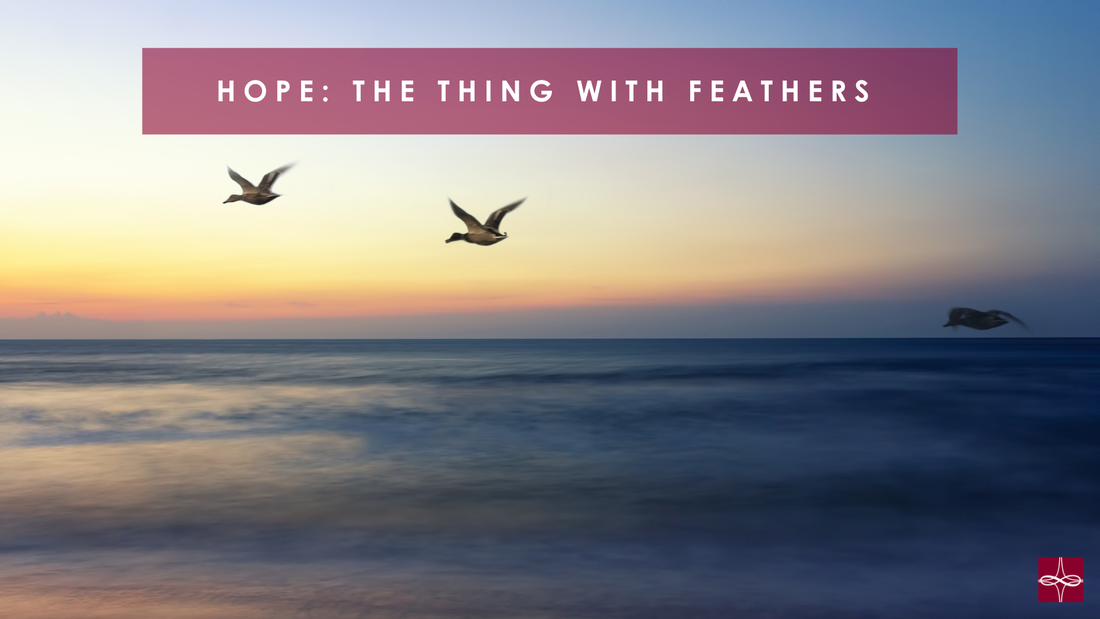
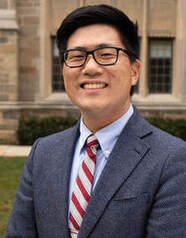
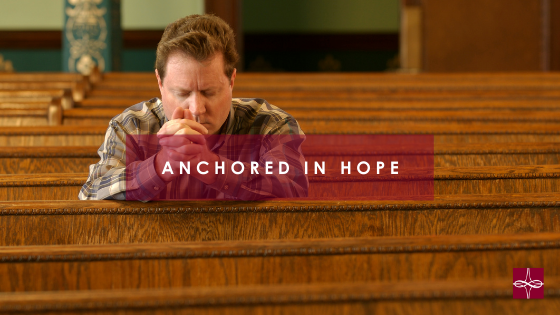
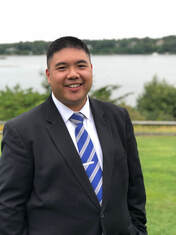
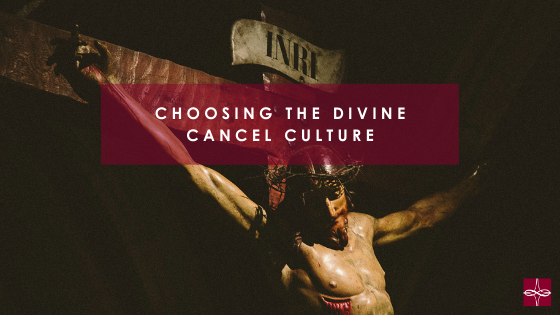

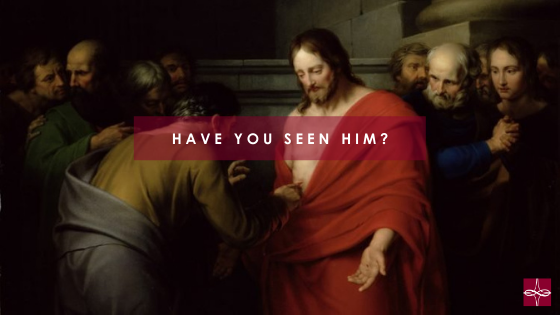

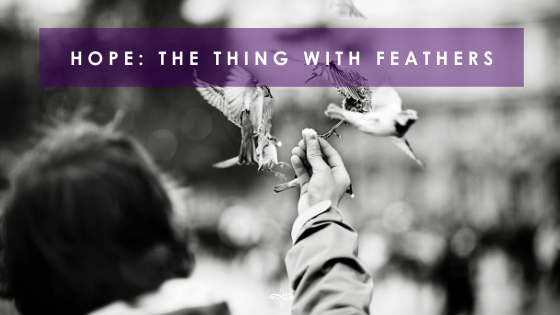
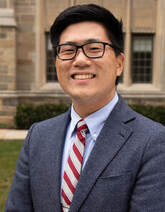

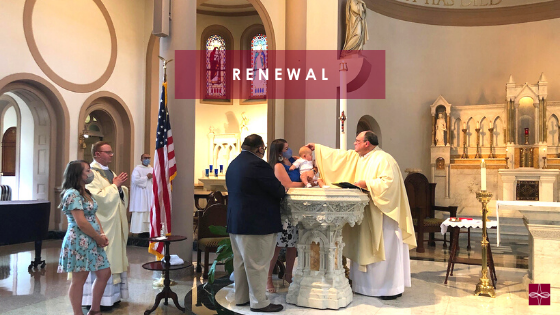

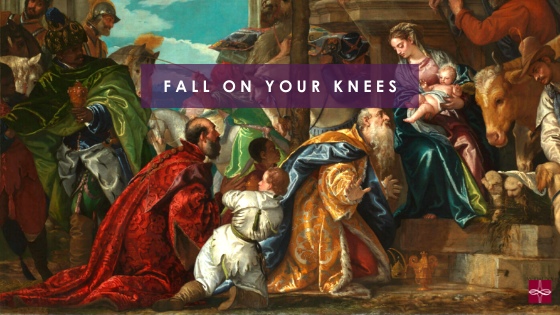
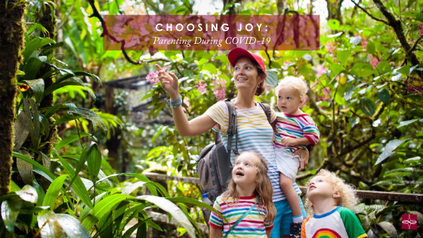



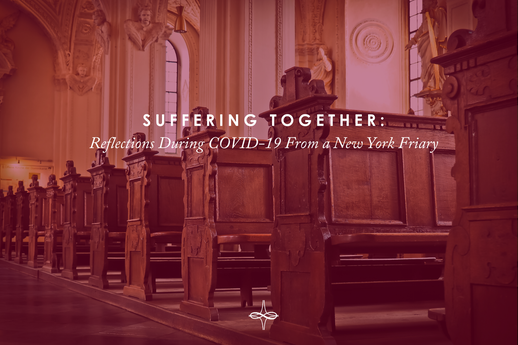
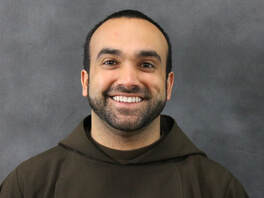
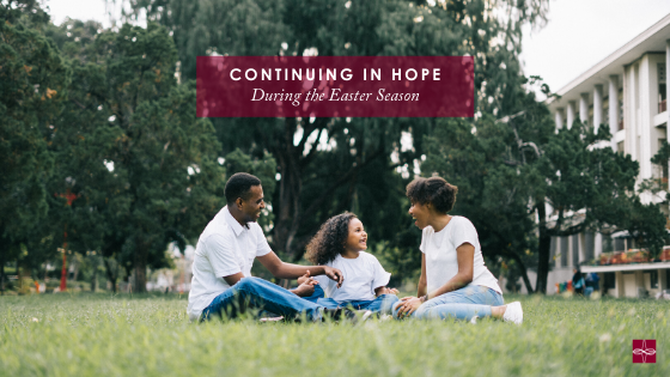
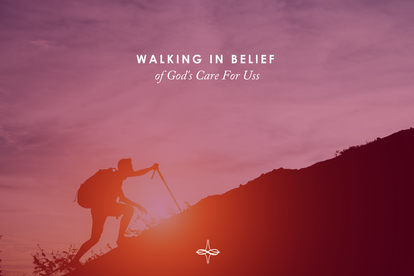


 RSS Feed
RSS Feed